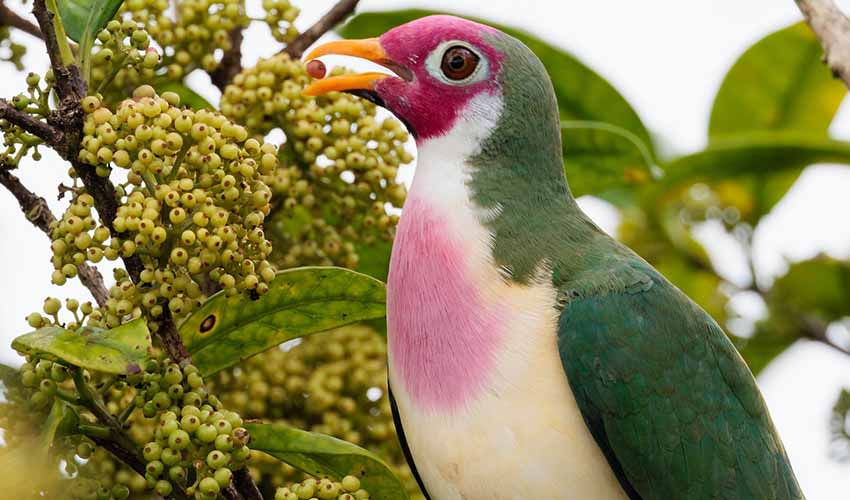Found in the tropical rainforests of Thailand, Malaysia, Indonesia, and the Philippines, this dove is part of the fruit dove family (Ptilinopus), known for their vivid plumage and quiet, arboreal lifestyles. The Jambu fruit dove, with its soft pastel feathers and striking facial colors, stands out even among its colorful relatives. It’s a creature that perfectly captures the elegance and vibrancy of the tropical forests it inhabits.
What makes the Jambu fruit dove so distinct is its extraordinary coloration. The male is especially eye-catching: his face is a brilliant crimson-pink, sharply contrasting with a white throat, a shimmering green back and wings, and a rosy-pink breast that fades into a soft white belly. The female, though less vivid, is equally lovely with shades of light green that help her blend into the foliage while nesting. Both sexes have delicate pink feet and bright yellow irises that sparkle in the sunlight. When perched quietly in the forest canopy, these doves look almost unreal—like living ornaments among the leaves.
The Jambu fruit dove’s behavior and lifestyle are as gentle as its appearance. It is primarily arboreal, spending most of its time in the treetops where it feeds on a variety of fruits, berries, and figs. True to its name, it has a special fondness for the jambu, or rose apple (Syzygium), as well as other soft fruits found in Southeast Asian forests. These doves play an important ecological role as seed dispersers, swallowing fruits whole and later excreting the seeds far from the parent tree—helping regenerate and spread the tropical flora. They are quiet and shy, often heard only through their low, mellow cooing, which adds a soft musical undertone to the forest soundscape.
Distribution
 Brunei
Brunei Indonesia
Indonesia Malaysia
Malaysia Myanmar
Myanmar Singapore
Singapore Thailand
ThailandAnything we've missed?
Help us improve this page by suggesting edits. Glory never dies!
Suggest an editGet to know me
Terrestrial / Aquatic
Altricial / Precocial
Polygamous / Monogamous
Dimorphic (size) / Monomorphic
Active: Diurnal / Nocturnal
Social behavior: Solitary / Pack / Flock
Diet: Carnivore / Frugivore / Omnivore / Piscivorous / Insectivore
Migratory: Yes / No
Domesticated: Yes / No
Dangerous: Yes / No




